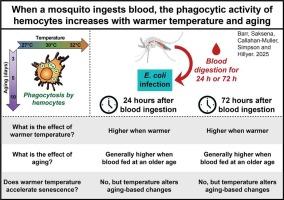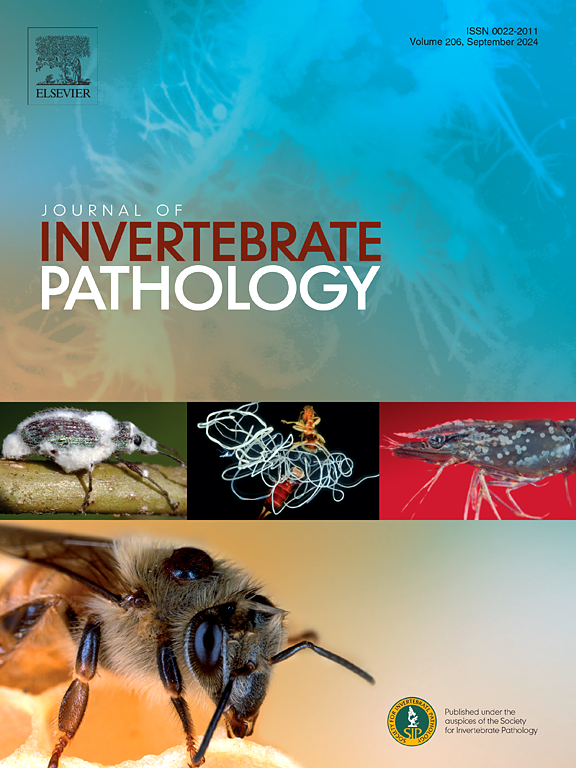当蚊子摄取血液时,血细胞的吞噬活性随着环境温度的升高和老化而增加
IF 2.4
3区 生物学
Q1 ZOOLOGY
引用次数: 0
摘要
大多数雌蚊以血液为食,以获取产卵所需的营养,但吸血的过程经常使蚊子暴露于病原体。血液摄食和感染都激活了驱动细胞免疫反应的血细胞,而吞噬等免疫反应的效果随环境温度、衰老及其相互作用而变化。在此,我们量化了成年雌蚊在消化血粉期间和之后的血液中血细胞介导的吞噬反应,重点是在27°C, 30°C或32°C饲养的蚊子,吸血时为3,5和10日龄。我们发现,在血液喂养的蚊子中,当温度变暖和蚊子变老时,吞噬活动通常会增加。此外,在血餐后的前三天内,较高的温度并不会加速吞噬反应的衰老。总之,这些发现表明,摄入血液改变了温度升高、衰老以及它们之间的相互作用如何改变血细胞的吞噬反应,这对蚊子如何应对感染并在其环境中生存具有影响。本文章由计算机程序翻译,如有差异,请以英文原文为准。

When a mosquito ingests blood, the phagocytic activity of hemocytes increases with warmer environmental temperature and aging
Most female mosquitoes feed on blood to gain the nutrients needed for oogenesis, but the process of blood feeding often exposes mosquitoes to pathogens. Blood feeding and infection both activate the hemocytes that drive cellular immune responses, and the efficacy of immune responses like phagocytosis varies with environmental temperature, aging, and their interaction. Here, we quantified the hemocyte-mediated phagocytosis response in the hemocoel of adult female mosquitoes during the digestion of a blood meal and thereafter, focusing on mosquitoes that had been reared at 27 °C, 30 °C or 32 °C, and were 3, 5 or 10 days old at the time of blood feeding. We discovered that, in blood-fed mosquitoes, phagocytic activity generally increases when the temperature is warmer and when the mosquito is older. Moreover, within the first three days after a blood meal, warmer temperature does not accelerate the senescence of the phagocytosis response. Altogether, these findings demonstrate that ingesting blood changes how warmer temperature, aging, and their interaction alters the phagocytic response of hemocytes, which has implications for how mosquitoes respond to infection and survive in their environment.
求助全文
通过发布文献求助,成功后即可免费获取论文全文。
去求助
来源期刊
CiteScore
6.10
自引率
5.90%
发文量
94
审稿时长
1 months
期刊介绍:
The Journal of Invertebrate Pathology presents original research articles and notes on the induction and pathogenesis of diseases of invertebrates, including the suppression of diseases in beneficial species, and the use of diseases in controlling undesirable species. In addition, the journal publishes the results of physiological, morphological, genetic, immunological and ecological studies as related to the etiologic agents of diseases of invertebrates.
The Journal of Invertebrate Pathology is the adopted journal of the Society for Invertebrate Pathology, and is available to SIP members at a special reduced price.

 求助内容:
求助内容: 应助结果提醒方式:
应助结果提醒方式:


